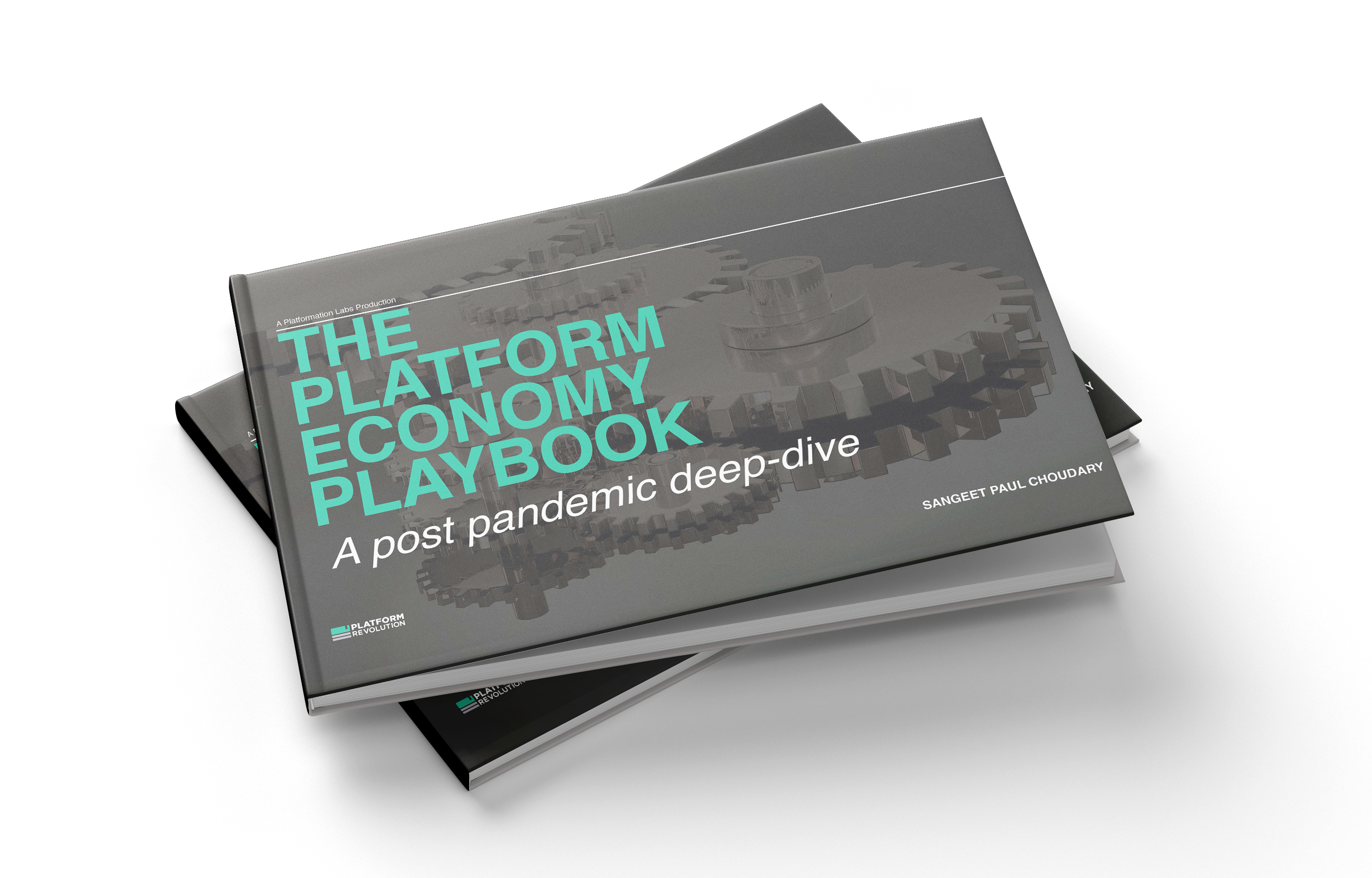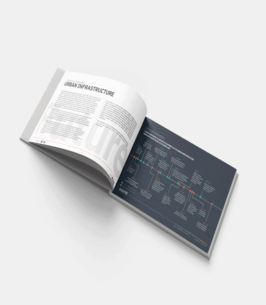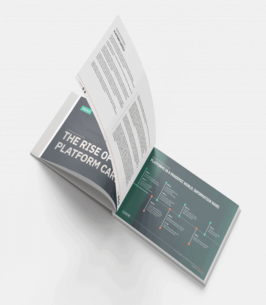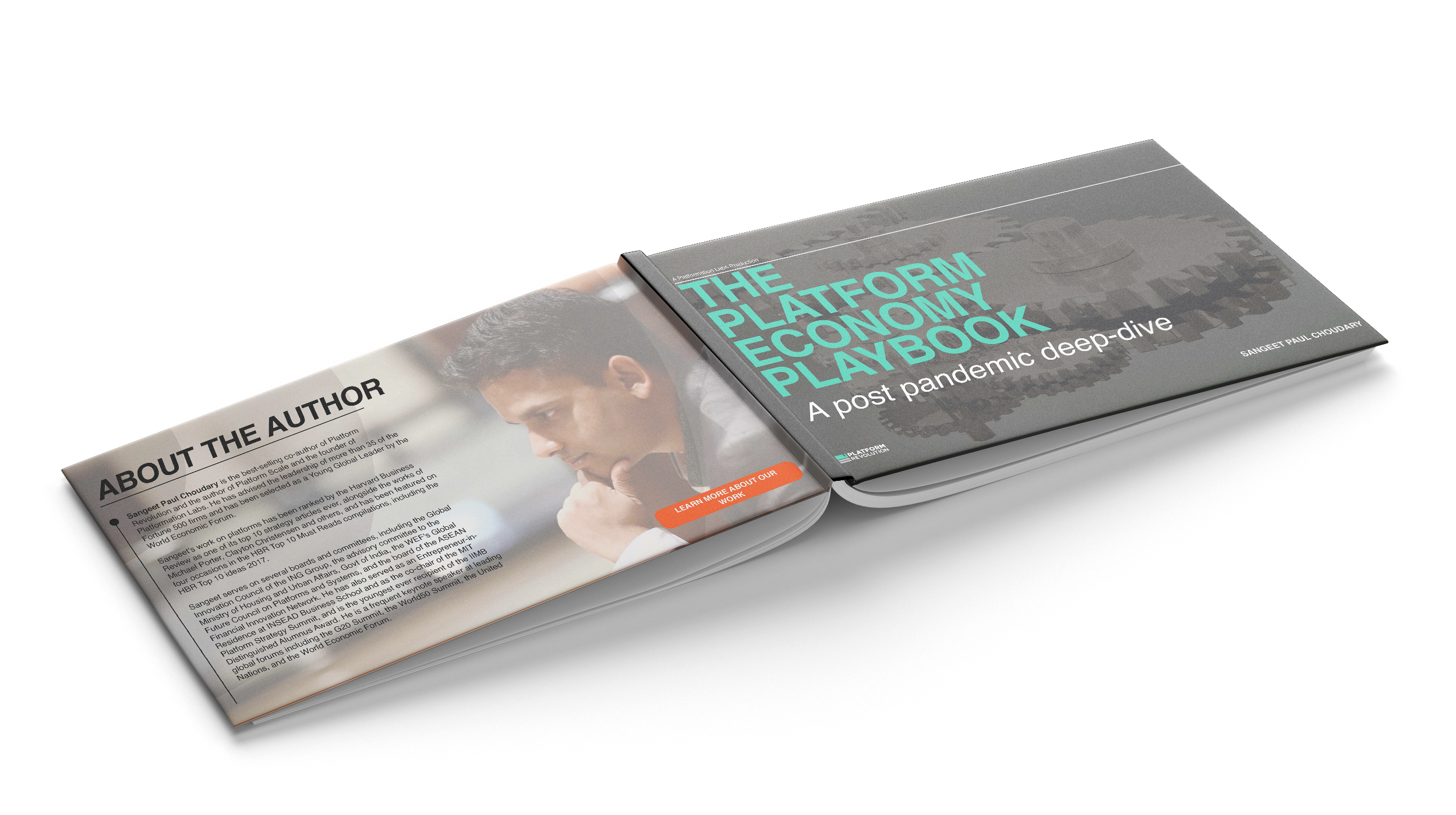Digital Transformation
Platform thinking and disruption: Interview with YourStory
Transforming business models with Platforms
I was recently interviewed by YourStory, a leading Asian startup blog on how Platform Thinking changes the way we build businesses. The following post is the first part of my interview. This was first published here.
Sangeet writes the blog Platform Thinking, which has been recommended by All Things Digital, GigaOm, Inc. Magazine and the HBS Centre for Entrepreneurship. He is also a contributing author to the book Managing Startups (OReilly Media). Singapore-based Sangeet’s analysis and articles have been featured in the Harvard Business Review, the Wall Street Journal, TechCrunch, TheNextWeb, Forbes, the Hindu and other media. He collaborates on his research with leading economists at the MIT Centre for Digital Business.
“I am obsessed with internet business models and network economics. I work on understanding why, and how, internet businesses disrupt traditional businesses, and factors that govern success and failure of internet business models,” shares Sangeet on his interest in the internet business space. No wonder his Linkedin title is ‘Internet Geek’!
I met Sangeet on the sidelines of Echelon 2013 in Singapore where he presented a keynote address on ‘Platform Thinking: Business Model Design for Internet Businesses’.
You write about “Platform Thinking” — can you describe what that is and how it applies to businesses?
Platform Thinking is an approach to understanding how the rules of business are radically changing in the age of the internet.
Traditionally, Pipes have been the dominant model of business. Firms create stuff, push them out and sell them to customers. Value is produced upstream and consumed downstream. There is a linear flow, much like water flowing through a pipe.
We see pipes everywhere. Every consumer good that we use essentially comes to us via a pipe. All of manufacturing runs on a pipe model. Television and Radio are pipes spewing out content at us. Our education system is a pipe where teachers push out their ‘knowledge’ to children. Prior to the internet, much of the services industry ran on the pipe model as well.
Had the internet not come up, we would never have seen the importance of platform business models. Unlike pipes, platforms do not just create and push stuff out. They allow users to create and consume value. At the technology layer, external developers can extend platform functionality using APIs. At the business layer, users (producers) can create value on the platform for other users (consumers) to consume. This is a massive shift from any form of business we have ever known in our industrial hangover.
Platforms power co-creation by users and extension by developers. APIs do not make or break a platform, a Submit/Upload/Create button is the API a user needs.
TV Channels work on a Pipe model, but YouTube works on a Platform model. Encyclopedia Britannica worked on a Pipe model, but Wikipedia has flipped it and built value on a Platform model. Our classrooms still work on a Pipe model, but Udemy and Skillshare are turning on the Platform model for education.
Platform Thinking is different from traditional business thinking. Creation of network effects is more important than simply bringing in users or charging all users to make money. Software and technology are not the end product. Instead, they simply serve as the underlying infrastructure that enables users to interact with each other. Most importantly, the business itself doesn’t create all the value so monetization can be quite complicated.
I believe that this is the business model of the future. Ironically, it is a very poorly understood business model. I’ve been obsessed with the way platform businesses work, and I work on understanding and explaining the management of such businesses. I often write about this at here. A few essays I would specifically recommend are:
A Platform Thinking Approach to Problem Solving
The Three Building Blocks of Platforms
A Platform Thinking Approach to Building a Business
Why do startups disrupt traditional businesses? What companies do you admire for successfully disrupting an industry? How have they done it?
Most startups that disrupt traditional industries are internet platforms that connect producers and consumers directly. Airbnb and its clones are creating a dent in the hotel industry. Amazon’s marketplace model has disrupted traditional retail, and its self-publishing model could create a dent in traditional publishing. Younger viewers spend more time on YouTube than on network television. LinkedIn is redefining the way the recruitment industry works.
In all these examples, there are three drivers for disruption:
Creation of new sources of supply: Wikipedia created the world’s largest repository of knowledge without relying on experts. YouTube gets orders of magnitude more eyeballs than any traditional TV channel, largely for a long tail of videos that would never find their way onto television. Upwork allows companies to get work done in an open, global marketplace. LinkedIn exposes passive job seekers or non-seekers to recruiters, who would be inactive on other channels.
Creation of new user behaviors on the demand side: A suggestion to shack up at a stranger’s apartment in a new city would have been considered crazy a few years back. Airbnb created an entirely new user behavior when it aggregated new inventory. YouTube redefined what we watch, as a result of the supply explosion. Carpooling.com made car pooling with strangers acceptable.
Platforms power co-creation by users and extension by developers. APIs do not make or break a platform, a Submit/Upload/Create button is the API a user needs.
Feel Free to Share
Download
Download Our Insights Pack!
- Get more insights into how companies apply platform strategies
- Get early access to implementation criteria
- Get the latest on macro trends and practical frameworks
Architecting a strong curation system: Changing user behavior is never easy. Getting users to behave in new ways is difficult, especially when the associated costs and risks are high. Staying at a stranger’s apartments in a new town can be risky (and has been in a few cases). Finding interesting videos amidst a plethora of content on YouTube can be quite daunting.
Platforms solve this problem through curation, a process by which they separate the best from the rest. YouTube, Reddit and Quora have a community voting system that bubbles up the best content. Airbnb has invested heavily in its curation mechanisms because of the high risks involved. In some cases, photographers certify hosts’ listings. Moreover, the platform has a robust review mechanism that lets each party rate the other. A strong curation and trust mechanism is the key source of value provided by the platform owner. It is also the most important determiner in the use of many such platforms.
But why can a larger company not do all of the above as well? Typically, disruption happens when the disruptor starts by being inferior on certain parameters as compared to the incumbent. If you think of platforms like the ones mentioned above, here’s how it works:
- These platforms create new sources of supply that had never existed before: No one would have imagined an inventory of travel accommodation composed of the houses of people living in the cities. The idea that a global audience could find amateur home video (as is often the case on YouTube) appealing would have been scoffed at.
- The new sources of supply tend to be inferior and less sophisticated compared to the existing ones: On Airbnb, the average listing, initially, doesn’t compare with established hotels in service quality and targets a price-conscious traveler. The same dynamic applies when comparing YouTube videos to traditional broadcast.
- Over time, the supply on these platforms evolves to compete directly with mainstream competitors: As the platform finds greater adoption among consumers, it attracts mainstream producers as well. As a result, the producer quality improves as the platform gains consumer traction, something that we’ve seen both with AirBnB and YouTube as well as with many other platforms.
I’ve written about this in detail at The Billion Dollar Startup Disruption.
What industries do you think are ripe for disruption in the near future?
There are three industries, in particular, that are ripe for disruption: Education, Legal services and Healthcare. Education has a highly curated supply side. You need a PhD (or some minimum qualification) to teach. Platforms like Skillshare and Udemy are trying to change that. The problem, though, is that education as an industry isn’t simply about teaching, it’s also about certification. Certification brings with itself regulatory concerns. These regulations are largely the reason incumbents are able to hold out and counter disruption at this point.
This is a pattern that we see across industries. Legal services, again, is an industry ripe for disruption, being a high value services vertical and one where the majority of the end product can be transmitted digitally. However, industry regulation, again comes in the way and protects the incumbents.
Healthcare, too, can benefit a lot from peer-to-peer connections.
The key challenge for disruptors today, is their ability to ‘hack’ these regulations. We’ve already seen regulations come in the way of disruption in travel/rental (Airbnb) and transportation (Uber, Carpooling.com).
But this disruption is bound to happen. Regulation typically lags innovation, and we’re currently in a phase where our administrators are still grappling with learning how to regulate platforms.
Tweetable Takeaways
Platforms power co-creation by users and extension by developers. APIs do not make or break a platform, a Submit/Upload/Create button is the API a user needs. Tweet
Startups disrupt by creating new sources of supply, new user behaviors and a strong curation system. Think Airbnb, Uber, YouTube or Twitter. Tweet
Regulations are largely the reason incumbents are able to hold out and counter disruption. Tweet
State of the Platform Revolution
The State of the Platform Revolution report covers the key themes in the platform economy in the aftermath of the Covid-19 pandemic.
This annual report, based on Sangeet’s international best-selling book Platform Revolution, highlights the key themes shaping the future of value creation and power structures in the platform economy.
Themes covered in this report have been presented at multiple Fortune 500 board meetings, C-level conclaves, international summits, and policy roundtables.
Subscribe to Our Newsletter













